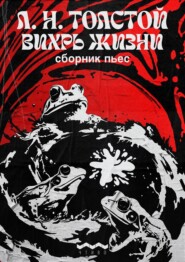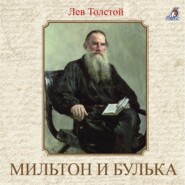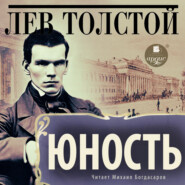По всем вопросам обращайтесь на: info@litportal.ru
(©) 2003-2025.
✖
Sevastopol
Настройки чтения
Размер шрифта
Высота строк
Поля
Not that there was any scorn apparent in their manner, but there was a certain self-satisfied tranquillity, founded partly on money and partly on their close intimacy with generals, a certain consciousness of superiority which even extended to a desire to hide it.
A thick-lipped young doctor and an officer of artillery, with a German cast of countenance, were seated almost on the feet of the young officer who was sleeping on the sofa, and counting over their money.
There were four officers' servants, some dozing and others busy with the trunks and packages near the door.
Among all these faces, Kozeltzoff did not find a single familiar one; but he began to listen with curiosity to the conversation. The young officers, who, as he decided from their looks alone, had but just come out of the military academy, pleased him, and, what was the principal point, they reminded him that his brother had also come from the academy, and should have joined recently one of the batteries of Sevastopol.
But the officer with the satchel, whose face he had seen before somewhere, seemed bold and repulsive to him. He even left the window, and, going to the stove-bench, seated himself on it, with the thought that he would put the fellow down if he took it into his head to say anything. In general, purely as a brave “line” officer, he did not like “the staff,” such as he had recognized these two officers to be at the first glance.
IV
“But this is dreadfully annoying,” said one of the young officers, “to be so near, and yet not be able to get there. Perhaps there will be an action this very day, and we shall not be there.”
In the sharp voice and the mottled freshness of the color that swept across the youthful face of this officer as he spoke there was apparent the sweet young timidity of the man who is constantly afraid lest his every word shall not turn out exactly right.
The one-armed officer glanced at him with a smile.
“You will get there soon enough, I assure you,” he said.
The young officer looked with respect at the haggard face of the armless officer, so unexpectedly illuminated by a smile, held his peace for a while, and busied himself once more with his tea. In fact, the one-armed officer's face, his attitude, and, most of all, the empty sleeve of his coat, expressed much of that tranquil indifference that may be explained in this way – that he looked upon every conversation and every occurrence as though saying, “That is all very fine; I know all about that, and I can do a little of that myself, if I only choose.”
“What is our decision to be?” said the young officer again to his companion in the short coat. “Shall we pass the night here, or shall we proceed with our own horses?”
His comrade declined to proceed.
“Just imagine, captain,” said the one who was pouring the tea, turning to the one-armed man, and picking up the knife that the latter had dropped, “they told us that horses were frightfully dear in Sevastopol, so we bought a horse in partnership at Simferopol.”
“They made you pay pretty high for it, I fancy.”
“Really, I do not know, captain; we paid ninety rubles for it and the team. Is that very dear?” he added, turning to all the company, and to Kozeltzoff, who was staring at him.
“It was not dear, if the horse is young,” said Kozeltzoff.
“Really! but they told us that it was dear. Only, she limps a little, but that will pass off. They told us that she was very strong.”
“What academy are you from?” asked Kozeltzoff, who wished to inquire for his brother.
“We are just from the academy of the nobility; there are six of us, and we are on our way to Sevastopol at our own desire,” said the talkative young officer. “But we do not know where our battery is; some say that it is in Sevastopol, others that it is at Odessa.”
“Was it not possible to find out at Simferopol?” asked Kozeltzoff.
“They do not know there. Just imagine, one of our comrades went to the headquarters there, and they were impertinent to him. You can imagine how disagreeable that was! Would you like to have me make you a cigarette,” he said at that moment to the one-armed officer, who was just pulling out his cigarette-machine.
He waited on the latter with a sort of servile enthusiasm.
“And are you from Sevastopol also?” he went on. “Oh, good Heavens, how wonderful that is! How much we did think of you, and of all our heroes, in Petersburg,” he said, turning to Kozeltzoff with respect and good-natured flattery.
“And now, perhaps, you may have to go back?” inquired the lieutenant.
“That is just what we are afraid of. You can imagine that, after having bought the horse, and provided ourselves with all the necessaries, – a coffee-pot with a spirit-lamp, and other indispensable trifles, – we have no money left,” he said, in a low voice, as he glanced at his companions; “so that, if we do have to go back, we don't know what is to be done.”
“Have you received no money for travelling expenses?” inquired Kozeltzoff.
“No,” replied he, in a whisper; “they only promised to give it to us here.”
“Have you the certificate?”
“I know that – the principal thing – is the certificate; but a senator in Moscow, – he's my uncle, – when I was at his house, said that they would give it to us here; otherwise, he would have given me some himself. So they will give it to us here?”
“Most certainly they will.”
“I too think that they will,” he said, in a tone which showed that, after having made the same identical inquiry in thirty posting-stations, and having everywhere received different answers, he no longer believed any one implicitly.
V
“Who ordered beet-soup?” called out the slatternly mistress of the house, a fat woman of forty, as she entered the room with a bowl of soup.
The conversation ceased at once, and all who were in the room fixed their eyes on the woman.
“Ah, it was Kozeltzoff who ordered it,” said the young officer. “He must be waked. Get up for your dinner,” he said, approaching the sleeper on the sofa, and jogging his elbow.
A young lad of seventeen, with merry black eyes and red cheeks, sprang energetically from the sofa, and stood in the middle of the room, rubbing his eyes.
“Ah, excuse me, please,” he said to the doctor, whom he had touched in rising.
Lieutenant Kozeltzoff recognized his brother immediately, and stepped up to him.
“Don't you know me?” he said with a smile.
“A-a-a-!” exclaimed the younger brother; “this is astonishing!” And he began to kiss his brother.
They kissed twice, but stopped at the third repetition as though the thought had occurred to both of them: —
“Why is it necessary to do it exactly three times?”
“Well, how delighted I am!” said the elder, looking at his brother. “Let us go out on the porch; we can have a talk.”
“Come, come, I don't want any soup. You eat it, Federsohn!” he said to his comrade.
“But you wanted something to eat.”
“I don't want anything.”
When they emerged on the porch, the younger kept asking his brother: “Well, how are you; tell me all about it.” And still he kept on saying how glad he was to see him, but he told nothing himself.
When five minutes had elapsed, during which time they had succeeded in becoming somewhat silent, the elder brother inquired why the younger had not gone into the guards, as they had all expected him to do.
He wanted to get to Sevastopol as speedily as possible, he said; for if things turned out favorably there, he could get advancement more rapidly there than in the guards. There it takes ten years to reach the grade of colonel, while here Todleben had risen in two years from lieutenant-colonel to general. Well, and if one did get killed, there was nothing to be done.

















